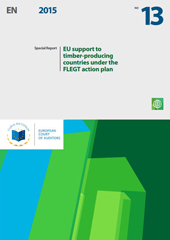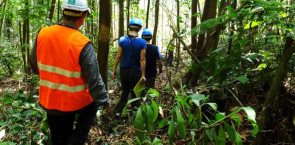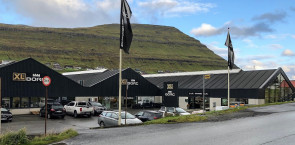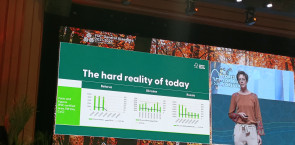
The European Court of Auditors has called for the EU FLEGT Programme to change gear in order to achieve tangible results faster. NEPCon forest legality expert Christian Sloth shares his thoughts on how FLEGT may build on and learn from certification schemes.
 Adopted in 2003, the Forest Legality, Governance and Trade (FLEGT) Programme is the key EU initiative to fight illegal logging. A recent assessment of FLEGT by the EU Court of Auditors resulted in a highly critical report.
Adopted in 2003, the Forest Legality, Governance and Trade (FLEGT) Programme is the key EU initiative to fight illegal logging. A recent assessment of FLEGT by the EU Court of Auditors resulted in a highly critical report.
The auditors point out that the programme’s key target has not yet been achieved – FLEGT licensing of legal timber. FLEGT licenses are expected to be the main result of the bilateral Voluntary Partnership Agreements (VPAs) between the EU and key timber producing countries.
NEPCon forest legality expert Christian Sloth comments: “In my view, it is too simplistic to look at the ‘hard-core’ results of the EU FLEGT Programme only in a global assessment of this initiative. Without any doubt, FLEGT has achieved significant impact in terms of forest governance and capacity building in timber producing countries. FLEGT projects around the world are helping to build the momentum for legal timber trade, even in countries that are facing serious governance issues.”
However, Mr Sloth concurs that it is now time to take FLEGT to the next level and focus more on linking the effort to the global trade.
The EU urged to implement the EU Timber Regulation
Among six key recommendations, the report urges the EU to enforce the EUTR across all Member States: “It is high time that the Commission insist on the strict implementation in all Member States of the timber regulation.”

The auditors are not alone in this opinion. A number of stakeholders have voiced this need over the past year, stressing that the EUTR is only as strong as the weakest link. Any member state that fails to enforce this law is leaving a door open for illegal timber to enter into the EU.
However, in September 2015 the European Commission took action by initiating infringement procedures against Greece, Hungary and Spain. According to the Commission, it is currently investigating the compliance of a fourth member state.
NEPCon has previously highlighted the need for the Commission to ensure consistent and stringent enforcement of the EUTR across all Member States. This will create a pull effect increasing the incentives for VPA countries to continue working towards FLEGT licenses.
Certification can link FLEGT to the trade

The EU auditors also recommend FLEGT to explore options for extended use of ‘reputable private certification bodies’. They conclude, “in view of the difficulties faced since the start of the FLEGT action plan in setting up state‑run licensing schemes in countries facing such capacity constraints, the Commission did not sufficiently promote synergies between FLEGT and private certification schemes.”
Mr Sloth supports this conclusion: “At NEPCon, we also see an untapped potential to create strong synergies between the VPAs, the EUTR and certification schemes.“
In their response, the European Commission stresses existing efforts of FLEGT and VPAs to build on private certification schemes. In addition, the Commission states, “It would also be fair to recognise the limitations of private certification schemes, which cover individual operators and small portions of territory while FLEGT licensing schemes cover the whole national territory.”
However, according to Mr Sloth, this argumentation ignores a couple of key points:
-
In practice, there is a key distinction between global and national schemes in terms of chain of custody (CoC) assurance. The chain of custody system implemented under a FLEGT VPA focuses on tracking of timber in the producer country. In cases where FLEGT-licensed timber is exported to third countries such as China for processing and subsequent re-export to the EU, the tracking of the FLEGT license claim will depend on the existence of chain of custody systems in the processing countries. Such systems do not exist today, which poses a challenge in terms of securing the supply chain integrity of FLEGT licensed materials.
-
The national level approach in itself involves serious limitations. The process of FLEGT licensing effectively stalls until all export timber produced in a VPA country can be considered legal. Meanwhile, there is no built-in mechanism to reward the performance of the ‘good guys’ – enterprises that already operate on a legal basis. There is a need for a stepwise approach including such recognition and this is where credible private schemes may play a role. Along with the market pull caused by the EUTR, they create instant incentive for those who are committed to trading legal timber.
“The national approach enables FLEGT to address wider issues of governance. However, adopting reward mechanisms for legal timber does not prevent progress towards full national FLEGT compliance. On the contrary, this would only underpin the aims of FLEGT,” states Mr Sloth.
NEPCon has suggested that FLEGT could learn from private schemes when it comes to facilitating trade in legal timber. For example, risk-based approaches such as those used in the FSC Controlled Wood system might enable trade from low-risk sources in the short term. An example of this would be 'plantation forest' versus 'natural forest'. The risk of illegal harvesting often differs significantly between those two main forest categories.
Such an approach would also enable a direct link between the VPAs and the EUTR. “The EUTR is based on this type of approach. In essence, EUTR due diligence is all about controlling risk,” observes Mr Sloth.
How to propel FLEGT forward

The report also warns that VPA countries may run out of steam unless they start to see some tangible results. According to the EU auditors, “There is a danger of ‘FLEGT fatigue’ setting in, as countries become frustrated with the lack of progress and are able to find other, less stringent markets for their products.”
Mr Sloth: “Although there is a risk of such frustrations, it is unlikely that FLEGT’s efforts will go to waste. This serious, long-term initiative has already made a deep and positive mark around the world. In my view, this is a perfect time to accelerate the process. FLEGT has created a solid platform for that, including a wealth of information and increased levels of awareness, stakeholder inclusion and capacity in the VPA countries.”
NEPCon suggests exploring the following options:
-
Acknowledging credible, global certification systems under the FLEGT Programme. The key points to consider would be a) Do the schemes cover timber legality at the right level and scope? b) Do the schemes include a robust, international chain of custody system? c) Is there a robust control system in place to ensure that the requirements are followed in practice?
-
Adopting criteria for credible chain of custody solutions for national schemes. It is important to consider how national schemes will work in a global world, in particular in terms of credible chain of custody assurance throughout the trade chain and across multiple countries. Again, adopting lessons learned from private certification schemes could provide inputs to the solution. For example, an online volume tracking system such as FSC’s Online Claims Platform might be a solution.
-
Adopting risk-based approaches. Such approaches push participants to focus on and address the real problems, whilst paying less attention to areas where the risk of legal violation is already known to be low. Risk-based schemes enable participants to ensure system compliance in an imperfect world. In practice, it is often ‘mission impossible’ to obtain a full guarantee of legal timber, whilst it is feasible to reduce the risk of illegal timber to a minimum.
“At the end of the day, risk-based approaches are more likely to achieve a high impact on the ground, and to do so sooner than any alternative approach. This is why leading schemes such as FSC have recently moved further to promote risk-based approaches,” comments Mr Sloth.
Numerous FLEGT projects have procured a wealth of information about the legal frameworks and the conditions in VPA countries. This data may be used as the basis for developing risk-based approaches to national monitoring and issuing of FLEGT licenses. NEPCon is involved in several projects that are aiming to synthesise FLEGT-driven data into industry-friendly guidance and information. Given that risk is also a central aspect of the EUTR, this would further enhance the synergy between the VPAs and the EUTR. -
Supporting the EUTR. Operators in the EU are often struggling to find adequate information about producer country legislation and related risks. Much of the FLEGT-generated information can be turned into guidance supporting EU Operators and Competent Authorities to implement the EUTR. Any such efforts should naturally underpin – not undermine – FLEGT’s efforts to improve forest governance, says Mr Sloth. “With the right approach, I firmly believe that the EUTR and existing certification schemes can be harnessed to drive the FLEGT process further along.”
-
Ensuring close coordination with similar legislation in place in other regions. Other timber laws that pull the global market in the same direction are in place in other regions. These include the US Lacey Act and the Australian Illegal Logging Prohibition Act, whilst additional legislation is under way in Japan and elsewhere. As timber trade is global, it makes sense for all these legal frameworks to align as closely as possible, for instance by using the same definitions and thresholds. This will enable the industry to streamline their efforts to meet the laws.
-
Revisiting the success criteria of FLEGT. NEPCon would question the expediency of using FLEGT licensing as the key measure of success. This tends to hide the many valuable impacts of FLEGT whilst forming a barrier to valuable short-term solutions. Some stepping-stones are clearly needed for the long journey towards the ideal situation, where the entire forest sector in VPA countries finally operates on a fully legal basis. This is bound to take time. The difficulty of achieving total legal compliance in the forest sector is evident even in Europe, where several EU countries still fail to do so.
Mr Sloth further underlines that FLEGT cannot stand alone as the EU’s sole response to illegal logging.
“Pressures on the world’s forests are shifting. In today’s world, timber trade is only one of several key drivers of illegal logging. It is increasingly important to look at the trade in non-timber commodities that often have a huge forest impact, such as soya and palm oil. Conversion of forests in order to grow these types of crops is often the main reason for illegal harvesting today. The world definitely needs FLEGT. But the EU also needs to look beyond FLEGT and explore additional avenues to support legal and sustainable timber trade,” he says.






